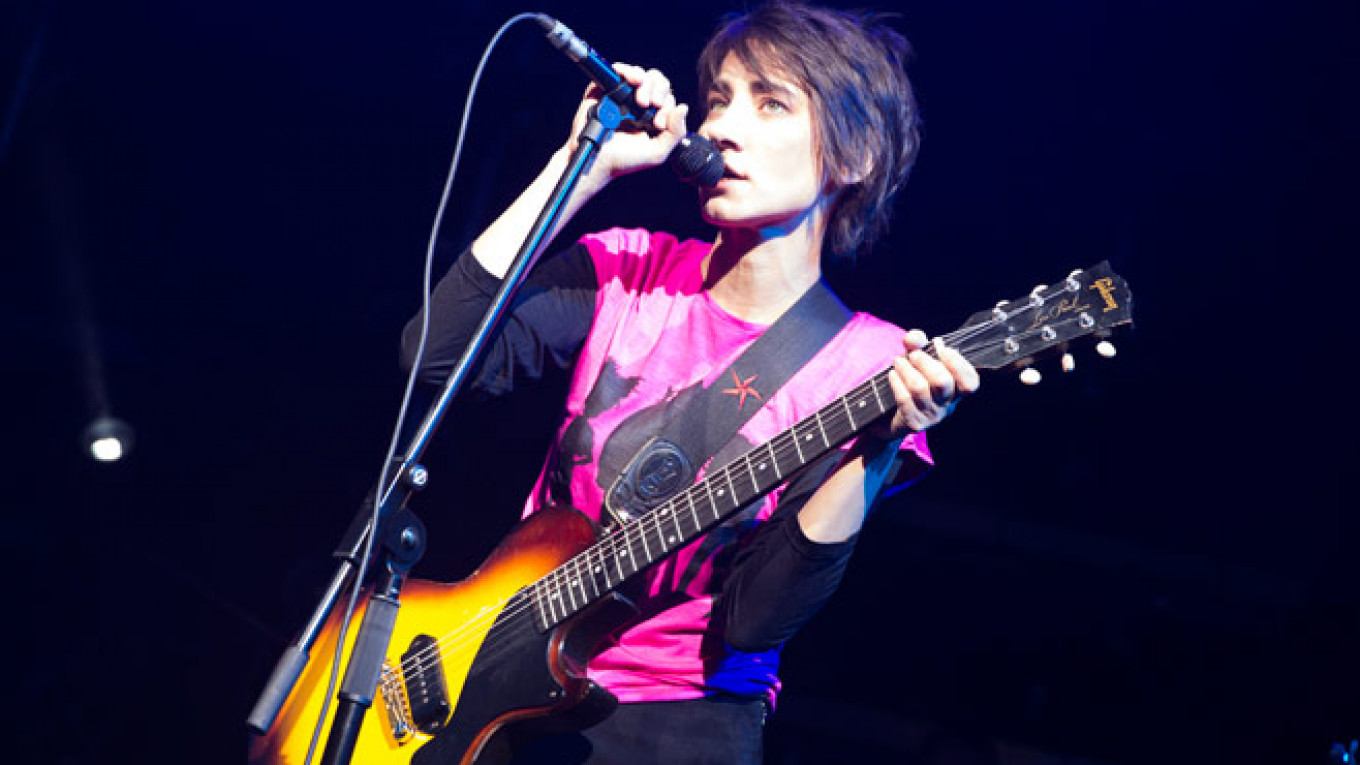After she waved a Ukrainian flag on stage Friday at a Tbilisi concert, Russian venues have shut their doors on beloved rock star Zemfira.
A fan gave the popular songstress, who has been a cult figure in Russia since the late 1990s, a Ukrainian flag as she performed in the Georgian capital. She then marched around the stage waving the blue and yellow banner as her fans cheered.
Zemfira has not made a statement clarifying her position on the Ukraine crisis.
Since then, a wave of concert organizers have announced their disinterest in organizing concerts for her, in the latest instance of an artist being politically scrutinized over the Ukraine conflict.
The Zemfira scandal burst into the spotlight after Alexei Pushkov, head of the State Duma's international affairs committee, polled his Twitter followers Saturday on the appropriateness of Zemfira's "action." The vast majority said they opposed it.
"Everyone has the right to choose. At one point, residents of Sevastopol made their choice. Zemfira made hers [on Friday], or perhaps, earlier. I don't think residents of Sevastopol would support her choice," Sergei Arbuzov, a promoter in the region, told tabloid television channel LifeNews over the weekend.
"In light of what has happened, I don't think as many people will flock to her concerts [as before]. As a result, the organizers would suffer losses," said Arbuzov.
Maxim Tatarinov, a promoter from St. Petersburg, told LifeNews that he had likewise abandoned plans to organize Zemfira's gig in Russia's second city after hearing the news.
"We'd been planning a huge Zemfira concert for this fall. She used to play sold-out concerts in large venues before. But after what happened [with the Ukrainian flag], my partners and I changed our minds," said Tatarinov.
Since Russia's annexation of the Crimean Peninsula in 2014 and the ensuing conflict between Kiev's forces and rebels in Ukraine's turbulent east, artists have been targeted by nationalist activists on both sides of the dispute.
Andrei Makarevich, front man of iconic Russian rock band Mashina Vremeni ("Time Machine"), was vilified over his decision to give a concert in a Kiev-held area of east Ukraine.
Russian nationalists crashed his show in September, pummeling audience members with pepper spray. Lawmakers at the State Duma called last August for Makarevich to be stripped of various honors bestowed on him by the state.
Numerous Russian venues also canceled scheduled concerts that were set to feature Diana Arbenina, another Russian rock star that expressed sympathy with Ukraine.
On the other side of the divide, several Russian singers and artists were denied entry into Ukraine over their pro-Russian stance.
Zemfira is set to headline at Afisha Picnic, one of Moscow's most popular summer festivals, at the end of July. The organizers have confirmed to The Moscow Times that no changes have been made to the lineup following the Tbilisi incident.
Contact the author at i.nechepurenko@imedia.ru
A Message from The Moscow Times:
Dear readers,
We are facing unprecedented challenges. Russia's Prosecutor General's Office has designated The Moscow Times as an "undesirable" organization, criminalizing our work and putting our staff at risk of prosecution. This follows our earlier unjust labeling as a "foreign agent."
These actions are direct attempts to silence independent journalism in Russia. The authorities claim our work "discredits the decisions of the Russian leadership." We see things differently: we strive to provide accurate, unbiased reporting on Russia.
We, the journalists of The Moscow Times, refuse to be silenced. But to continue our work, we need your help.
Your support, no matter how small, makes a world of difference. If you can, please support us monthly starting from just $2. It's quick to set up, and every contribution makes a significant impact.
By supporting The Moscow Times, you're defending open, independent journalism in the face of repression. Thank you for standing with us.
Remind me later.


